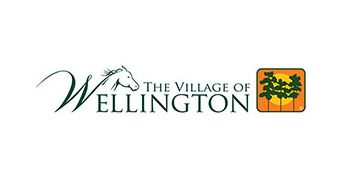Wellington’s Assistant Planning, Zoning & Building Director Michael O’Dell has continued making the rounds of advisory boards with his presentation on the new golf cart study and ordinance that the village is considering. The Planning, Zoning & Adjustment Board meeting Wednesday, March 10 was the fifth showing of the slide show and talk.
PZA board members were particularly interested in the difference between traditional golf carts and “street-legal” varieties, including how they are treated under the proposed ordinance.
O’Dell is seeking village input on the draft of its new ordinance that plans to make operation of golf carts legal in the village on village-owned pathways. He presented the draft ordinance, answered questions and collected input.
Currently, state law makes it legal to use golf carts only on local streets that have a posted speed limit of less than 25 mph, within homeowners’ associations, on a golf course or on private property. In these limited locations, state law makes it legal for 14-year-old, non-licensed drivers to operate a golf cart, and there is nothing Wellington can do about it if they were to want to.
However, everywhere else except these limited locations, golf carts are illegal. The new ordinance has the objective of opening up the use of golf carts on the multi-modal pathways and widened existing pathways throughout the village.
The draft ordinance recommends a maximum speed of 15 mph on the multi-modal pathways, requires drivers to be licensed and at least 16 years old, and requires golf carts to be registered.
O’Dell explained that the ordinance provides occupancy limitations, requires a Wellington registration sticker, certain safety equipment and the signature of the golf cart’s owner on an affidavit to acknowledge the owner understands the rules. After the village enacts the ordinance, local Palm Beach County Sheriff’s Office deputies will begin education and enforcement efforts.
Older village pathways are eight-feet wide, and newer pathways are 12, with some of the eight-footers now being expanded to the 12-foot size. “We are using grants where [the village] can, but ultimately some monies from the general funds will be used to widen the pathways,” O’Dell said.
The PZA board is the final input before the measure is presented to the Wellington Village Council for discussion in late March or April.
During a two-hour meticulous forensic review, the board took apart the ordinance, ensuring that they understood every element of it and pursued lines of questioning to encompass every eventuality.
One issue is that there is a difference between a garden variety golf cart and a similar looking vehicle which is “street-legal.” The latter has a Vehicle Identification Number, lights, mirrors and other required safety equipment. It is legally considered a slow-moving vehicle. In other words, a car.
PZA Board Member Maureen Martinez asked numerous questions. She thought it was unfair that “street legal” golf carts were not allowed on the pathways. Several other members thought she had a point, particularly if they obey the speed limit.
Despite such vehicles legally being cars, there remains the question as to where you draw the line. O’Dell noted the comments and promised to pass them along.
Board Member Salvatore Van Casteren was concerned that regulation of golf carts would require an increase in the PBSO budget. Several other members were also concerned this may become a problem.
Van Casteren suggested that there should be street markings showing where golf carts can drive legally, seatbelts should also be required and the affidavit or registration note the legal number of passengers the particular vehicle was built to accommodate. “I admire counsel for taking this up because this issue has been talked about and the can has been kicked down the road for 10 years,” he said.
PZA Board Chair Elizabeth Mariaca agreed, pointing out that there is no ordinance now. “Even though we don’t have to, we should do something about this matter,” she said.
Pathway linkages and the missing gaps were a concern, as was the phrase “zero tolerance” related to enforcement. “It is not in keeping with the Village of Wellington,” Mariaca said.
O’Dell and PBSO Deputy Harold Harper each pointed out that PBSO interactions over the past few years have included a couple of wrecks and some reckless operation.
O’Dell added that the biggest problem in the past 10 years, in addition to a handful of crashes, were trespassing complaints with teenagers driving across a golf course.
Each of the board members thanked O’Dell and the staff for their hard work on this issue.
“It’s difficult to be trailblazers,” PZA Board Member John Bowers said, before being asked if it was an intentional pun.
The next business item was to repeal the education and public-school facilities elements of the village’s comprehensive plan and replace them with a newly written and Education Committee approved education element.
Planning Director Tim Stillings presented the background information and explained the element.
“As part of the comprehensive plan, this updates the education element, which had been a combination of public-school facilities and education. It takes into account a number of changes to the state statutes.”
There was a single question. PZA Board Vice Chair Jeffrey Robbert wondered about the coordination of traffic patterns for dropping off and picking up students from school so the traffic patterns that back up into roadways don’t impact ongoing traffic as much.
Stillings noted the suggested change, and the element passed unanimously.








